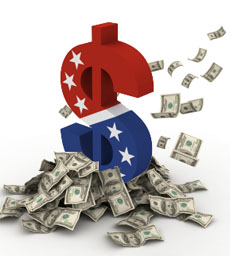LEAD: Congress set for uncertain vote on financial bail-out
 Washington - The US House of Representatives was set to vote Monday on a massive deal to rescue the US economy from the brink of financial meltdown, but it remained far from certain that the legislation would be approved.
Washington - The US House of Representatives was set to vote Monday on a massive deal to rescue the US economy from the brink of financial meltdown, but it remained far from certain that the legislation would be approved.
Congressional leaders forged an agreement Sunday, but lower-level legislators in both parties threatened to derail the process, resenting the need to put taxpayer money on the line to bail out greedy Wall Street investors.
The bill is intended to thaw out frozen credit lines with the government purchase of up to 700-billion-dollars worth of soured mortgage-backed securities.
President George W Bush made a final plea Monday for Congress to approve the Emergency Economic Stabilization Act, which he called "a bold bill that will help keep the crisis in our financial system from spreading throughout our economy."
The House held a spirited three-hour debate Monday morning ahead of a planned vote on the bill. The Senate will vote later this week.
Bush said the bill would address the "root causes" of a financial crisis that has already led to two of the largest bankruptcies in US history - Lehman Brothers Holdings Inc and Washington Mutual Inc - as well as a series of government takeovers.
US stocks plunged some 3 per cent on opening Monday, following drops in world markets as the crisis appeared to spread to Europe.
Financial services giant Fortis was partially taken over by the Belgian, Luxembourg and Dutch governments while Britain nationalized mortgage lender Bradford & Bingley.
Back in the United States, Citigroup Inc agreed to take over the banking operations of Wachovia Corp Monday, absorbing up to 42 billion dollars in losses. The government's Federal Insurance Deposit Corp, which announced the takeover, insisted the deal did not amount to a bail-out.
During week-long negotiations on the 700-billion-dollar proposal, legislators reduced the initial cost to 350 billion dollars with the remainder to be authorized later.
Other changes to the plan originally drafted by US Treasury Secretary Henry Paulson included curbs on executive pay and severance, so-called golden parachutes, for top officials at companies that seek to sell mortgage securities to the federal government.
The government would also have the option of taking equity stakes in some firms to allow taxpayers to recover some of the bail-out costs in cases in which federal help leads to eventual profits or higher stock prices.
A rescue oversight committee has also been added to the bail-out legislation in response to demands from members of both the majority Democrats and minority Republicans.
Credit has seized up across the US economy as lenders became reluctant to dish out new loans during a crisis sparked by losses on subprime mortgages.
Even supporters of the bill characterized it as a bitter pill to swallow in order to keep that credit - the backbone of the US economy - flowing smoothly.
"This is an easy bill to vote against ... Many Democrats don't like it. Many Republicans are choking on it," said Henry Waxman, the Democratic chairman of the House Oversight and Government Reform Committee. "But for now it would be irresponsible to do nothing."
Conservative House Republicans have been the main roadblock to the rescue plan, demanding that Wall Street carry more of the burden if the government doesn't recover its money.
"We can't allow the American taxpayer to become the insurance policy for financial decisions that didn't quite turn out as planned," said Gresham Barrett, a Republican congressman from South Carolina. "I fear that this legislation erodes that accountability and the freedom that comes with it."
Bush, who has less than four months in office, has little remaining clout with his fellow Republicans in Congress, who already blame his low approval ratings for their loss of a majority in congressional elections two years ago.
Tony Fratto, a White House spokesman, said Bush and Vice President Dick Cheney have been on the phone with Republican lawmakers urging them to back the legislation.
"We hope to see it pass and we're confident that it will pass," Fratto said.
Democrats are also worried about the political fallout of the unpopular Wall Street bail-out as expressed by constituents via angry e-mails and phone calls to legislators.
House Speaker Nancy Pelosi, leader of the Democrats in the lower chamber, called it a necessary investment to keep the economy afloat but expressed the frustrations of many on the floor.
"When was the last time anyone ever asked you for 700 billion dollars? It's a staggering figure," Pelosi said. (dpa)